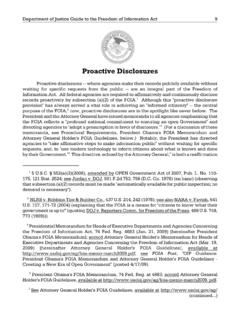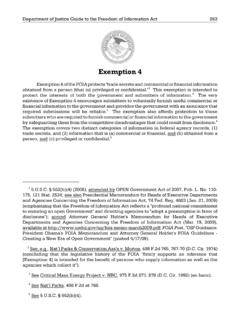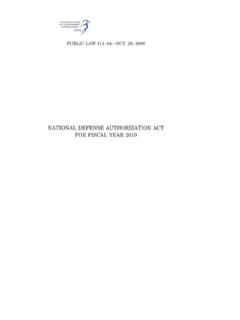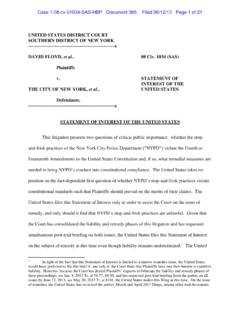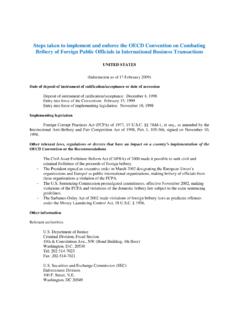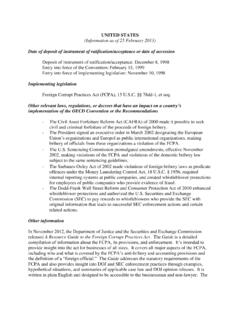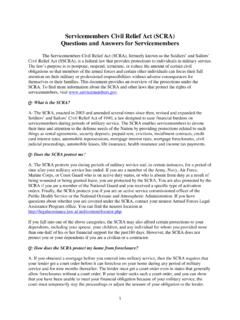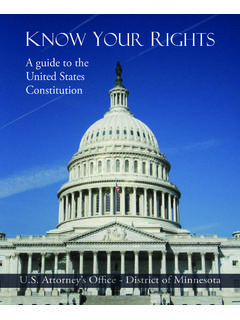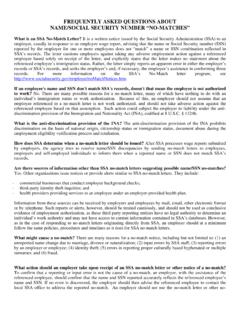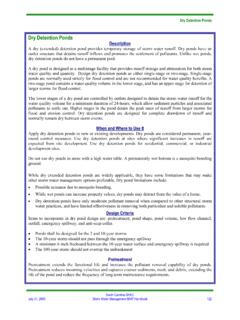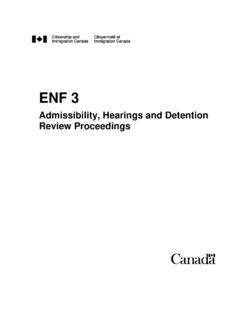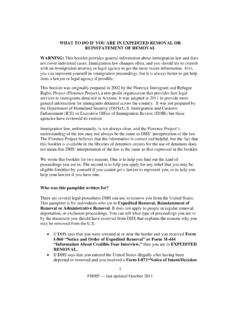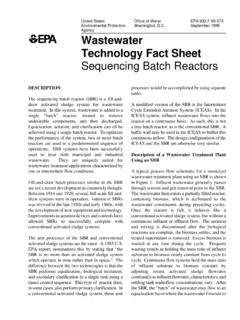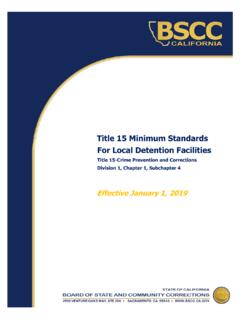Transcription of HOW TO APPLY FOR VOLUNTARY DEPARTURE
1 1 Last updated October 2011 HOW TO APPLY FOR VOLUNTARY DEPARTUREWARNING:This booklet provides general information about immigration law and does notcover individual cases. Immigration law changes often, and you should try to consult with animmigration attorney or legal agency to get the most recent information. Also, you can representyourself in immigration proceedings, but it is always better to get help from a lawyer or legalagency if booklet was originally prepared in 2002 by the Florence Immigrant and Refugee RightsProject (Florence Project), a non-profit organization that provides free legal services toimmigrants detained in Arizona. It was adapted in 2011 to provide more general information forimmigrants detained across the country.
2 It was not prepared by the Department of HomelandSecurity (DHS) Immigration and Customs Enforcement (ICE) or the Department of Justice(DOJ)/Executive Office for Immigration Review (EOIR), but these agencies have reviewed law, unfortunately, is not always clear, and the Florence Project s understanding ofthe law may not always be the same as DHS or the DOJ s interpretation of the law. TheFlorence Project believes that the information is correct and helpful, but the fact that this bookletis available in the libraries of detention centers for the use of detainees does not mean that DHS or the DOJ s interpretation of the law is the same as that expressed in the wrote this booklet for two reasons. One is to help you find out if you may qualify forvoluntary DEPARTURE .
3 The second is to help you APPLY for any relief that you may be eligible foreither by yourself if you cannot get a lawyer to represent you, or to help you help your lawyer ifyou have was this booklet written for?This booklet is for people who are in the custody of DHS and who have been placed in removalproceedings. removal is what used to be called deportation. This booklet is not applicableto persons who are in deportation or exclusion proceedings. If you were placed in immigrationproceedings after April 1, 1997, you are probably in removal proceedings. You can tell whattype of proceedings you are in by the document you should have received from DHS that has thecharges against you (or reasons you can be removed from the )If the document is labeled Notice to Appear, you are in removal the document is labeled Order to Show Cause, you are in deportation the document is numbered at the bottom, Form I-110 or I-122, you are in updated October 2011If you are in deportation or exclusion proceedings, the requirements for qualifying for voluntarydeparture may be different, and you should consult with an attorney or a legal agency or ask thejudge if you qualify for VOLUNTARY is VOLUNTARY DEPARTURE ?
4 If you have no way of lawfully remaining in the United States, VOLUNTARY DEPARTURE is permissionto leave the country in a way that has fewer negative consequences than being removed. removal is when DHS removes you from the United States to the country where you are acitizen, whether you want to be removed or not. VOLUNTARY DEPARTURE is when DHS wants toremove you, but you ask to be allowed to voluntarily leave the United States using your ownmoney for the trip to your everyone qualifies to ask for VOLUNTARY DEPARTURE , which we explain in more detail , there are consequences which affect your future ability to return to the United States,whether you get removed or leave voluntarily. We will explain these consequences, so youcan make an informed decision on whether you want to APPLY for VOLUNTARY DEPARTURE or not.
5 Itis almost always better not to ask for removal or VOLUNTARY DEPARTURE unless you have nodefense to removal such as asylum, withholding, NACARA, Cancellation of removal or apending family do I use this booklet?First, read the whole booklet. It will help you to understand how leaving the under an orderof removal or VOLUNTARY DEPARTURE may affect your ability to return to the United States lawfullyin the future. If you decide you want to APPLY for VOLUNTARY DEPARTURE , this booklet will help youunderstand whether you qualify for it and what you need to do to get evidence in support of arequest for VOLUNTARY DEPARTURE . It is important to understand that it is up to YOU to get togetherthe papers and the travel money that you need.
6 Also, it is up to you to get evidence in support ofyour VOLUNTARY DEPARTURE do I APPLY for VOLUNTARY DEPARTURE ?Depending on when you ask for VOLUNTARY DEPARTURE , you may be able to ask DHS or theimmigration judge for VOLUNTARY DEPARTURE . You do not need to file any particular forms orpapers. But, you may want to provide evidence in support of your request for voluntarydeparture, which we will discuss in detail they really remove me if I have been here most of my life? What if I have a wife orchildren who are citizens?3 Last updated October 2011 Yes. Immigration judges remove people in these circumstances all the time. It is a mistaketo think you cannot be removed. Only citizens cannot be if I have a way of avoiding removal , but I don t want to stay in detention .
7 Can t I tryto get VOLUNTARY DEPARTURE and come back later?You should have read a document on this CD explaining the various defenses to removal . If youthink you might qualify for any of them, you should read the manuals which should be availableto you entitled: How to APPLY for Asylum or Withholding of removal (includes discussion ofNACARA), How to APPLY for Three or Ten Year Cancellation, How to APPLY forCancellation for Certain Lawful Permanent Residents. If you qualify for any of these defenses,you should consider fighting your case! If you get an order of removal or VOLUNTARY DEPARTURE ,you give up your rights to fight for these defenses!!!If you qualify for a defense and you are frustrated about being in detention , you should see ifyou qualify for a bond, and if so, try to bond out of the detention facility and continue fightingyour case.
8 There should be available to you a booklet that talks about bonds called All AboutBonds. Some people who were detained at a border checkpoint, an international airport orseaport do not qualify to ask the judge to let them out of detention or to give or lower theirbond. However, in that situation, they might have the right to ask DHS, itself, rather than thejudge for their release from if one of my family members has filed for an immigrant visa ( green card ) for me?Can t I just get VOLUNTARY DEPARTURE and come back when the visa arrives?If one of your family members has filed a petition (called an I-130 petition ) with INS or DHSto get you lawful permanent residency (a green card ), it may or may not be a good idea to askfor VOLUNTARY DEPARTURE .
9 If your family member filed the I-130 petition before January 15, 1998,and if your visa is ready when you get placed in removal proceedings, in most cases, it is betterto not ask for VOLUNTARY DEPARTURE or removal . The reason is that if your visa is ready before yourlast court date, you can usually get your lawful permanent residency here in the United Statesand avoid having to leave the country at all. Leaving the country, even under an order ofvoluntary DEPARTURE may affect your ability to return to the United your family member has not yet applied for you, or your visa is not going to be ready in timeto avoid removal , it might be a good idea to try and get VOLUNTARY DEPARTURE . Please read thebooklet How to Get Legal Status Through a Family Member (Adjustment of Status) beforeyou decide whether to APPLY for VOLUNTARY updated October 2011I.
10 WHAT ARE THE CONSEQUENCES OF LEAVING UNDER removal ORVOLUNTARY DEPARTURE ?Generally, if you qualify for VOLUNTARY DEPARTURE , it is better than getting ordered removed. But,there are consequences regarding your ability to return to the in the future whetheryou leave through VOLUNTARY DEPARTURE or removal . It is important that you understand all ofthe possible consequences, which differ depending on where you were detained by DHS, yourcriminal history and the length of time you have been in the consequences of removal and VOLUNTARY DEPARTURE are complicated. In certain cases, afterleaving the under removal or VOLUNTARY DEPARTURE , you cannot return to the for certaintime periods without getting permission ( advance consent ) from DHS.
